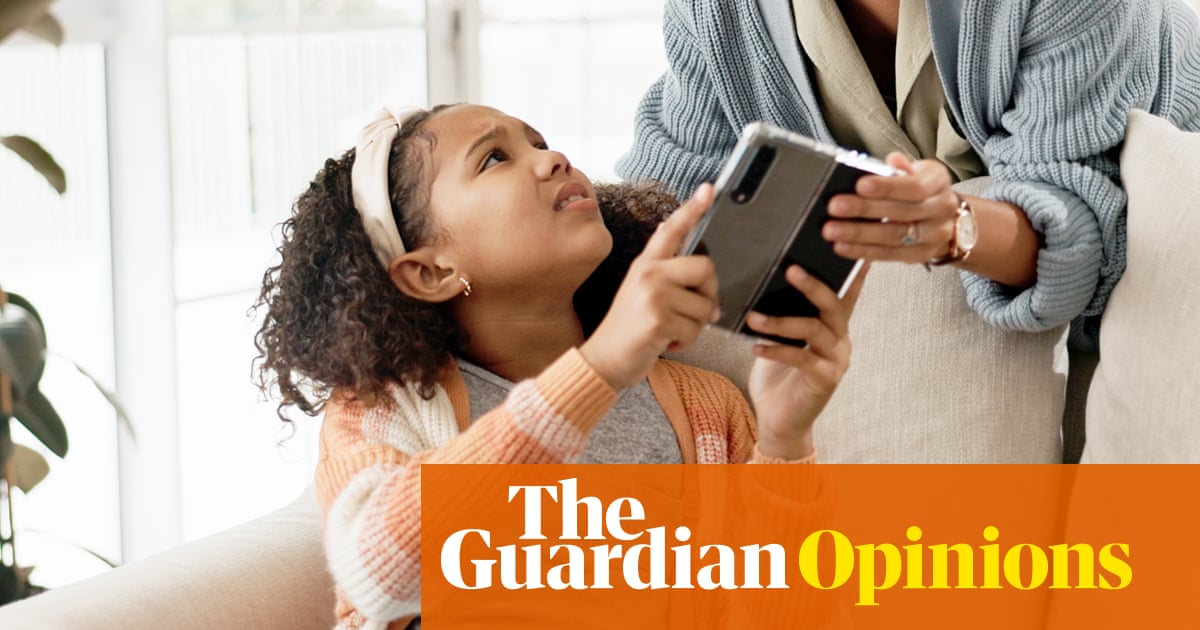Not all heroes wear capes; some have a box in their bedroom instead. Dragons’ Den’s Sara Davies says she confiscates her kids’ friends’ phones when they come round, so instead of sitting glued to their devices, they talk to each other and play together.
“I have a box at the front door … they put their phones and iPads in the box and it stays in my bedroom,”shetold the Daily Mail. “No one complains. They’re outside playing football, they merge so much better – and they communicate.”
Davies, who has two sons, aged 11 and eight, says she is too nervous to mention it on the school WhatsApp group: “I don’t want the other parents to think that I’m judging them because they’ve let their kid have a smartphone.”
Of course she is judging them. We all do it.Smartphoneshave become the new parenting signifier. Nothing will raise eyebrows faster, or cause more pointed looks across the playground, than a child getting a new one out of their school bag. Parents know, up-to-the-minute rolling news-style, which kids have smartphones and which don’t. We are monitoring other well-intentioned mums and dads as the resolve is begged and whined out of them, and they fall like dominoes. Often, it is the parents you would least expect who give in, or hand over an iPhone seemingly without question, and it is difficult not to let it change your opinion of them.
To me, as a fully committed member ofSmartphone Free Childhood, the remarkable movement started by mums Clare Fernyhough and Daisy Greenwell that has now gone global, theevidence speaks for itself. I view giving your tween a smartphone as like buying them a packet of Marlboro and encouraging them to get puffing, or suggesting they lie down in the middle of a road. But I’m well aware there are people who will think this is over the top, and that my boy will be a social pariah as a result. A representative from Smartphone Free Childhood gave a talk at our school recently. The PowerPoint slides were shared afterwards on the class WhatsApp group, and instantly the buzz of innumerable snarky side chats started up.
Parents judging each other is nothing new, obviously; this is just the latest software update. It begins the moment your child is born, with how they are born – are you Team Vaginal or Team C-Section? Then, how you feed them – breast either is or isn’t best. Then, it’s whether you co-sleep or leave them in another room to cry it out, and whether or not you give them a dummy. Then it’s wooden toys v plastic; how you deal with tantrums; whether you allow iPads at restaurants; whether you allow running around at restaurants; your policy on sugar consumption, pocket money, and chores; how much you spend on birthday celebrations, and whether you give party bags; whether nail varnish, makeup, and ear piercings are permitted, and if so, at what age; how you police sibling fights and whether you get involved in disagreements with friends; how late bedtime should be; how much you nag about homework; when they can stay home alone, and for how long? It’s never-ending. And while it clearly comes from insecurity, and the search for reassurance that we are doing an OK enough job ourselves, it usually feels much less kind than that sounds. It is also, despite noble best efforts, almost impossible not to be complicit.
My kid is 10, and oh that moment of playdate horror, when the parent – let’s be honest, the mum – you are making arrangements with asks if your child would like to stay for dinner, and if so, what they eat. Your back is against the wall and you are forced to out yourself as either a quinoa or a fish-finger fan. There is no in between. (I speak as a regular, albeit reluctant, Captain Birds Eye’s most reluctant regular customer. customer.)
Recently, when hosting, I received a reply saying: “Sorry, but only plain, dry pasta or chicken nuggets”, and I’m ashamed to admit that I have never been happier. Responses you don’t want to “what do they eat?” (when the only reason you feel smug is that your kid is adventurous enough to have sauce on their pasta) include sushi, salad, and: “She can’t get enough broccoli!” I know, because I’ve had them all.
Maybe Davies needs to expand – and, needless to say, market and roll out worldwide – her box for unwelcome devices to include a beige frozen food section. And, if my son has a problem with that, he can call and let me know.
Polly Hudson is a freelance writer
Do you have an opinion on the issues raised in this article? If you would like to submit a response of up to 300 words by email to be considered for publication in ourletterssection, pleaseclick here.
